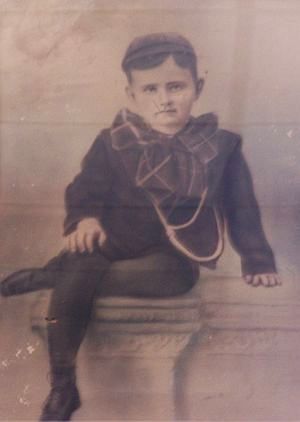 |
Karl Lawrence King was born in the Ohio village of
Paintersville February 21, 1891, and grew up in Xenia, Cleveland, and Canton.
The local town band in Canton stirred his love and talent for music, so
at the age of eleven he bought a cornet with money earned by selling newspapers
and began taking lessons. He soon exchanged that instrument
for a euphonium which he played in the Canton Marine Band (made
up of boys his own age).
Karl's only formal music instruction consisted of four piano lessons and one harmony lesson from a musical show director, William Bradford. Since his formal education ended with completion of the eighth grade, he then set about learning the printing trade as an apprentice. Composing at night, Karl worked at the printer's shop during the day. |
the 1909 Neddermeyer Band of Columbus, Ohio
Karl is the tall euphonium player in the 4th row -
left side
His first professional playing was with the Thayer
Military Band of Canton
and the Neddermeyer Concert Band (1909) of Columbus.
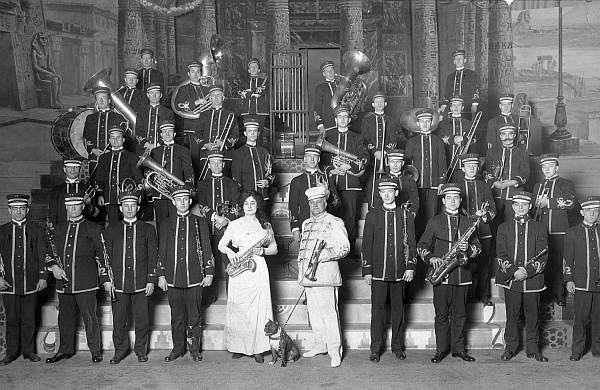
click photo for larger image (530kb)
or here
for the Karl King portion even larger
The Barnum and Bailey Circus Band of 1913 - 1913
season route
Ned Brill, conductor
Karl King is in the third row, just right of center
At age 19, Karl joined Robinson's Famous Circus (1910) as a baritone player. Over the next several years he played baritone with the Yankee-Robinson (1911), Sells-Floto (directed by W.P. English, 1912), and Barnum & Bailey Circuses (directed by Ned Brill, 1913). It was in that year that he wrote Barnum and Bailey's Favorite, which became one of the most popular marches in the world. It was soon adopted as the theme song of that circus.
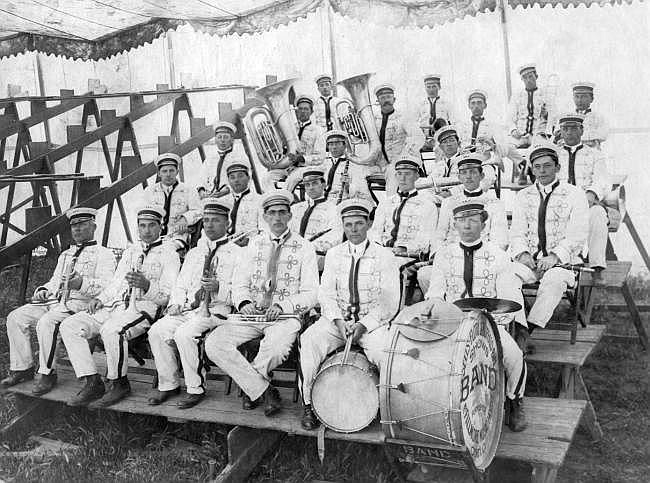
click image for a roster and more photos of Sells-Floto bands
the Sells-Floto & Buffalo Bill Wild West Combined
Shows Band of 1914
Karl is in the middle of the front row.
Note the slightly different uniform - Karl was the
director at this time.
In 1914 Karl King was appointed bandmaster with the Sells-Floto and Buffalo Bill Wild West Combined Shows, a position he held through 1916. For two years he was then Bandmaster with Barnum & Bailey's Greatest Show on Earth taking along his wife, Ruth (Lovett), who played a calliope with the circus. Because of the irregular lifestyle which accompanied circus life and the "questionable" people who traveled with the circus, Ruth's parents had not been eager to have their daughter marry a circus bandleader.
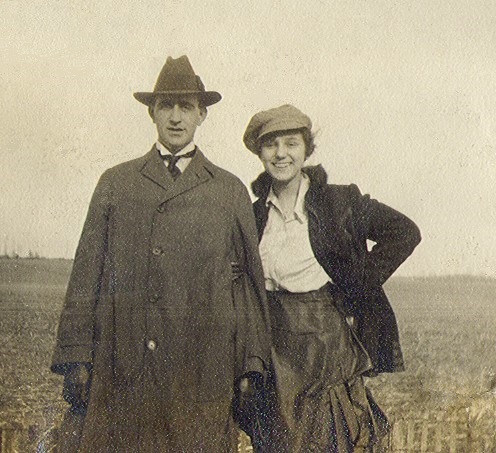
This is a 1915 photo of Karl King and Ruth Lovett, a year before they were married.
1919 G.A.R. Band of Canton
Karl King is seen with a moustache in the back row
slightly left of center.
In 1919 the Kings returned to Canton where he directed the Grand Army Band of Canton, Ohio, and in 1920 Karl King gave up circus life for good when he accepted the position of conductor of the Fort Dodge (Iowa) Municipal Band. Under his leadership that band became a popular fixture at state and regional fairs, rodeos, and expositions.
Karl King's gift for composing was apparent at an early age, and he had several compositions published while still in his teens. In all, King published over 200 marches. In addition to this impressive feat, which earned him the title America's March King, he also composed waltzes, overtures, intermezzos, serenades, dirges, rags, and galops, totaling almost another 100 selections.
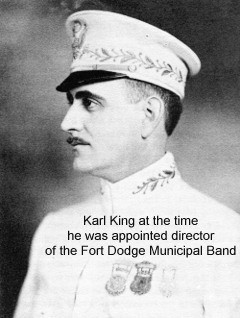 Karl
King moved to Fort
Dodge, Iowa, in 1920 as the result of a classified advertisement in
a national musician's publication for the position of conductor of the
Fort Dodge Municipal Band, a post which he accepted and held for over 50
years. There in Fort Dodge he raised his family (one son, Karl
Jr.), established a successful music publishing business, composed music,
and directed the municipal band. He and his band appeared at numerous state
and regional fairs, rodeos and expositions, as well as local concerts.
The official title of the band was the Fort Dodge Municipal Band, but within
a short time after he assumed leadership of the group it became known simply
as
King's Band. After his death, it was formally renamed
the
Karl L. King Municipal Band of Fort Dodge.
Karl
King moved to Fort
Dodge, Iowa, in 1920 as the result of a classified advertisement in
a national musician's publication for the position of conductor of the
Fort Dodge Municipal Band, a post which he accepted and held for over 50
years. There in Fort Dodge he raised his family (one son, Karl
Jr.), established a successful music publishing business, composed music,
and directed the municipal band. He and his band appeared at numerous state
and regional fairs, rodeos and expositions, as well as local concerts.
The official title of the band was the Fort Dodge Municipal Band, but within
a short time after he assumed leadership of the group it became known simply
as
King's Band. After his death, it was formally renamed
the
Karl L. King Municipal Band of Fort Dodge.
King's influence on the band was immediate and considerable. The older members of the band liked him and respected him as a conductor and musician, and took pride in his national reputation. He quickly established his goals, style, and program repertoire, which was pleasing to the band members and the audiences alike. He was a demanding but patient leader, expecting the very best from each musician.
Younger members of the band, usually high school musicians, viewed him with a combination of admiration, total respect bordering on awe, and just a tinge of fear that they could not measure up to his standards. His influence on these younger players had a profound effect on their lives. Many went on to become distinguished musicians, educators, and bandmasters themselves. Reginald Schive, later a director of the same band, is an example. No one who played under the baton of Karl King would ever forget the experience and the pride of having once worn the uniform of King's Band.
The Karl King Band at the Corn Palace in Mitchell, South Dakota in 1921
Karl King became a beloved and respected citizen and a dominant personality in his new home town. His friendship was treasured by everyone who knew him, and his advice and opinions were sought and respected. He became a quiet but forceful influence with the community leaders, local politicians, the local newspaper, and the local radio station. He always worked for the betterment of his community with the same pride, diligence, and care that he used when rehearsing his band.
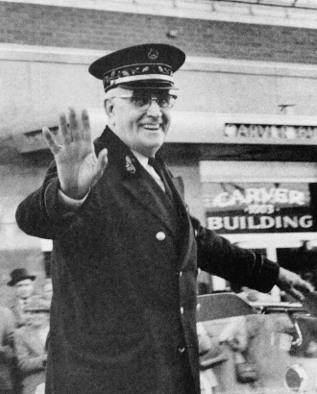 |
Karl was quite a familiar figure on main street. Most mornings he could be seen in the next door barbershop having one of his greatest pleasures, stretching out in the chair getting his morning shave. He would usually have his coffee break at the corner restaurant, visiting with the main street businessmen. His daily walk to the post office (a block and a half) took up a considerable portion of his day. Everyone he met stopped to say hello, visit, seek advice, or comment on his latest concert. Karl had time for each of them, including occasionally someone down on their luck seeking a handout. His twice weekly trip to the Fort Dodge Messenger with his program for the Sunday or Thursday night concert always included a short visit with the editor, or a joke with his good friend, the city editor, and a word with the reporter to whom he delivered the program. And, often as not, he would stroll into the galley room next to the news room where one of his young band members would be changing or cleaning type. Karl would reflect on his own youth as an apprentice printer, often staying long enough to get some printer's ink on his fingers or shirt. | |||

Karl King became a great favorite with the press and radio media. He was always intelligent in his opinion, pertinent, frequently witty, and always quotable. His trips, guest appearances, and honors were always major news items. In 1956, when his moustache worn since 1919 was shaved, it was dutifully featured in the local paper under the caption, Fort Dodge Loses Another Famous Landmark. King belonged to the First Congregational Church, the Masonic Lodge, Commandery Shrine, High Twelve Service Club, Rotary Club, Elk's Club, and was an honorary member of the Chamber of Commerce. He served as the president of the Iowa Bandmasters Association and also as president of the American Bandmasters Association. He held an Honorary Doctor of Music degree from Phillips University in Enid, Oklahoma. He was elected in 1962 to the highest honor that can come to a band director, the Academy of Wind and Percussion Arts. He was elected in 1966 to the Society of European Stage Actors and Composers. King was given in 1967 the Kappa Kappa Psi National Honorary Band Fraternity Distinguished Service Award, and in 1971, the Edwin Franco Goldman Award (the first non-school band director to receive this coveted award given by the National Band Association). In 1980, the National Band Association listed Karl in the Hall of Fame of Distinguished Band Conductors. |
||||
Long after the Karl King's circus days, he continued
to travel with his band and perform at many events.
View articles showing
his travel to towns in Hamilton County, Iowa.
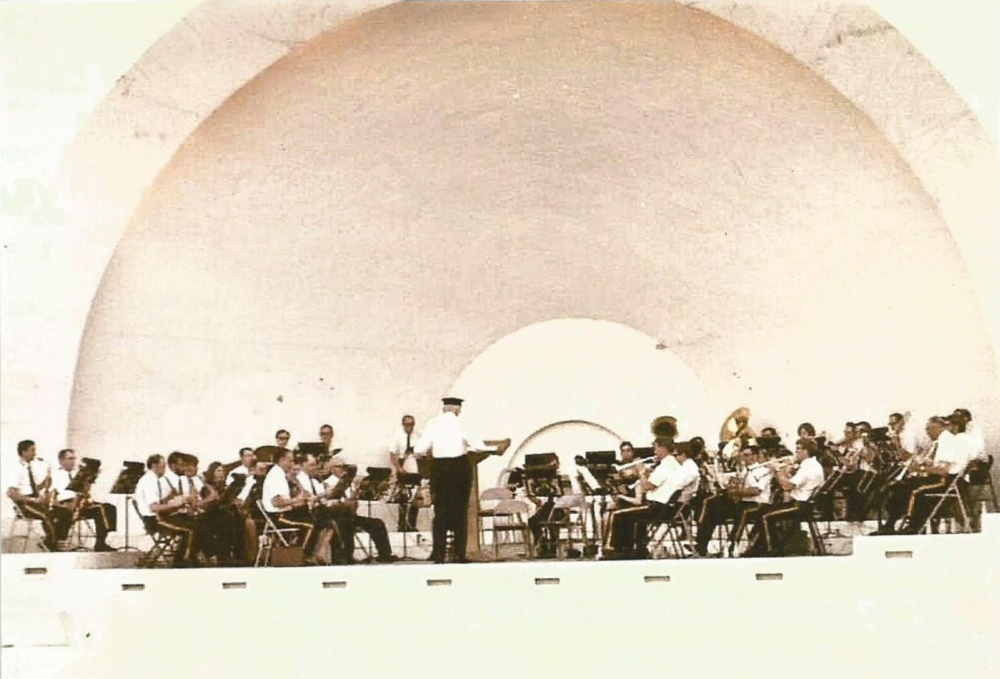
|
|
View the video about theLife
of Karl King from the
2021 Windjammers Annual Convention. |
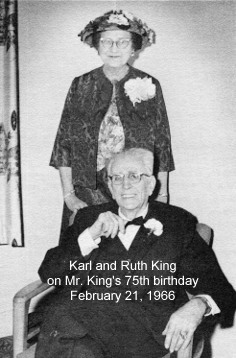 |
In 1966, King said: I've sung my song. It
was a rather simple one; it wasn't too involved; I'm happy about it. In
the last couple years . . . I've run out of tunes. When I ran out
of tunes, I believed it was time to quit, and I'd like to recommend that
as a matter of policy to all other composers.
Karl and Ruth King were buried in Fort Dodge. Their monument is near the entrance of North Lawn Cemetery. In 1975 Karl King received posthumously the Iowa Award, which is the highest honor the state can bestow on an individual. The award was presented by Governor Robert Ray to Karl's wife, Ruth King, during ceremonies at the All-State Music Festival in Ames. Thanks to Duane A. Olson for much of the material
|